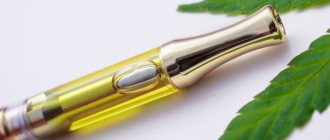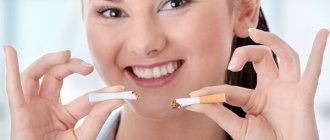People who smoke for a long time often experience strange and unpleasant sensations. For example, after smoking a cigarette, your legs or teeth begin to hurt. It is in this case that the smoker realizes that nicotine consumption does not have the best effect on health and thinks about quickly getting rid of the smoking habit.
But instead of feeling better, the person becomes even worse. Everything hurts. What to do? These sensations are alarming and frightening. Those who quit smoking have no idea what to do in this case and start smoking again. In the end, everything goes in circles.
Let's look into this situation. In this publication we will talk about the body’s reactions after quitting cigarettes, and why a person quitting smoking feels unwell. You can also learn about the unpleasant side effects that you may experience and how to deal with them.
Response to quitting smoking
For heavy smokers with a long history, metabolism is not possible without the harmful components of cigarettes. It is not so easy for the body to rebuild itself after the toxins stop coming in. Withdrawal syndrome as the body's response to the lack of nicotine occurs after quitting smoking .
Withdrawal syndrome has the following symptoms:
- Severe cough producing brown mucus. After years of smoking, soot and soot have accumulated in the lungs, this is a normal process that does not need to be alarmed. The restoration of the ciliated epithelium provokes the expulsion of sputum and mucus from the bronchi.
- Constant colds. Many smokers may have reduced immunity after quitting the bad habit. Nicotine serves as a kind of doping for the body, so its absence causes stress. Because of this, the body becomes powerless against many diseases - such as ARVI, acne, stomatitis and others.
- Discomfort and irritability. Many people smoke to suppress stress at work or at home. After the intake of the “sedative” intoxicant stops, irritability becomes more active. Because of this, there are often cases when a former smoker takes his anger out on one of his relatives. During this period, it is necessary to support his desire to give up his addiction and try to distract him from various problems. This symptom is the most difficult to overcome, because it will be difficult for a former smoker to resist the next dose of nicotine.
- Headaches and discomfort in the stomach. Such problems arise on the third day. Cleansing the body of nicotine lasts several weeks, because during the recovery period, malfunctions in the functioning of some systems occur. Headaches appear due to vasospasm, spasmodic pain occurs in the abdomen, and bowel movements are disrupted. You need to wait a couple of weeks for these problems to go away.
The above symptoms may cause discomfort, but they are associated with the recovery process. Benefits of quitting smoking:
- absence of unpleasant odor from the mouth, hair and skin;
- restoration of normal breathing and disappearance of shortness of breath;
- normalization of taste buds;
- improvement of skin color, elimination of circles and swelling under the eyes;
- normalization of blood circulation.
What has changed in seven days without cigarettes?
Much has changed, the pangs of withdrawal have weakened significantly. Physical ailments: cough, dizziness, absent-mindedness have almost disappeared and do not cause much trouble.
More and more often I began to feel a feeling of vivacity and a surge of strength. Lots of energy, but it’s still hard to manage.
Thoughts about cigarettes continue to haunt me constantly. Of course, it’s not like in the first days, when not even 5 minutes could pass without me thinking about a cigarette and not being upset about its absence, but still there is a problem. Thoughts come less frequently and are usually associated with certain events.
For example. I grilled kebabs over the weekend, guys, I can’t say that I enjoyed it. All the time while I was frying the meat, the thought of a cigarette could not leave my head; it seemed that this was what was missing for complete happiness. Because of this, a joyful event turned into some kind of torture. Thoughts came into my head that I was now doomed for the rest of my life to experience the annoyance of not having cigarettes during such events. It’s just scary how tightly this habit has entered my life.
Cleansing and restoration of the lungs
On average, it takes up to 3 months to completely clean and restore the lungs. Each body is individual, so the process may be slower or faster in different people. It is mainly influenced by the experience of a former smoker, since intoxication and the degree of blockage of the bronchial tract depend on the number of cigarettes smoked.
Experts recommend medications and traditional medicine methods to speed up and facilitate the process. But you should definitely consult your doctor, as taking expectorants can lead to serious complications, such as bronchiectasis.
Smoking causes the greatest damage to the lungs, so the process of repairing the bronchi is the most complex and significant. The process starts approximately 24 hours after the last cigarette smoked. This occurs due to a decrease in the irritability of epithelial cilia.
With their activation, the active pushing of phlegm and mucus out begins, therefore, in old age, people with extensive smoking experience may develop a severe cough. This will last about a week, after which mucus secretion normalizes and the epithelial cilia calm down.
Next, new cells free from nicotine grow. The entire recovery stage takes about six months.
How to help the body fight nicotine residues?
To summarize, we remind you that you can help your body cope with the stress that has fallen on it. It is very wise to enlist the help of a doctor who will prescribe a complex of vitamins that will boost your immunity early on and you will avoid cold symptoms. Mucolytic drugs will quickly get rid of an unpleasant cough and phlegm in the lungs. In order for the lungs to cleanse themselves faster, it is useful to take more walks in the fresh air and visit the bathhouse.
A large amount of liquid, and especially milk, has a very good effect on the recovery process; it is this that is able to cleanse the lungs of carbon monoxide, which managed to settle on them during smoking.
Proper nutrition and exercise will improve the condition of the cardiovascular system and restore the respiratory system. You can start jogging in the morning or turn your attention to cycling.
Soothing teas and tinctures of rosehip, nettle and motherwort will reduce blood pressure and stabilize the emotional background. If you are unable to cope with psychological discomfort, go for a consultation with a doctor who will prescribe a number of medications to improve your emotional state. Today, there are a huge number of proven methods that were developed specifically for people who want to give up nicotine addiction. By following pre-thought-out recommendations, it will be much easier to adapt to a new way of life and distract yourself from the desire to smoke.
Don't be afraid to change your life for the better, the main thing is to take the first step and be patient. Don’t miss the moment when you can still fix something in your body, because the number of diseases that smoking causes is simply enormous, and their consequences are terrifying. Quitting smoking in any case has a positive effect on the body. Even though breaking the habit can sometimes be quite difficult, the results will be worth it.
Preventing impotence
Smoking leads to impotence. After giving up a bad habit, men's sex drive decreases. This does not happen due to a lack of nicotine, but because the body redirects all its forces to restore the body. The psychological state of a former smoker becomes tense.
When the initial stage of withdrawal passes, sexual desire will be restored, and the risk of decreased potency in the future will also disappear. In some situations, alarming signs may arise in which you need to seek help from a doctor:
- pain or difficulty during urination;
- discharge from the genitals;
- pain during sexual intercourse;
- severe nervousness.
Healing gymnastics
Former smokers should pay special attention to physical activity. Exercising will help avoid depression, which is typical during the withdrawal period, and significantly improve heart function and vascular condition. You need to start your morning with light exercise. By the way, it is useful to complete the morning “warm-up” with a special exercise created by the famous Japanese professor of medicine Katsuzo Nishi.
It consists of the following:
- Lie on your back.
- Raise your legs and arms.
- Carry out rotational movements with all limbs simultaneously.
The total execution time is 2-3 minutes. This exercise effectively works to strengthen vascular walls and reanimate the functioning of capillaries. It also helps restore the normal supply of tissues with oxygen and nutrients.
As for including sports activities into the usual life of a former smoker, the greatest benefit will come from such hobbies as:
- yoga;
- swimming;
- bike;
- jogging;
- Nordic walking;
- roller skating, cross-country skiing.
Skin improvement
Many people, having given up smoking, discover an unexpected fact - nicotine worsens the condition of the skin. Tobacco smoke changes the color of the fingers and the area around the mouth.
The effects of nicotine are more systemic. There is a narrowing of capillaries and peripheral vessels, which leads to a decrease in the supply of oxygen to skin cells. This causes dryness, wrinkles also form and resistance to external influences decreases.
A decrease in nicotine levels in the body leads to a gradual restoration of oxygen supply to skin cells. Visible results do not come so quickly, especially after 40 years. Diet and walks in the fresh air activate and improve the process.
Passive smoking causes almost the same negative effects on the skin. Under the influence of cigarette smoke, it becomes dry, so women are not recommended to be near people who smoke.
When a person quits smoking
He thinks that, unfortunately, even children whose families follow a healthy lifestyle are not protected from the consequences of smoking. After all, everywhere, be it a park, an underground passage, a cafe, it is impossible to hide from tobacco smoke, even despite the adoption of relevant laws. So it turns out that the youngest and most vulnerable suffer from the irresponsibility of adults. He notes that passive smoking is considered even more harmful than active smoking, even if the mother smokes away from the stroller or in the kitchen, and not in the nursery. That is, all those diseases that overtake adults can also affect their children. And the child’s body is much more delicate, and it is constantly exposed to the influence of a deteriorating environment and harmful food additives, to which, as is known, it reacts much more strongly than the established body of an adult. He realizes that all those diseases that a strong adult body can still cope with hit a child’s body twice as hard. He understands that parents themselves set an appropriate example for their children
Health recovery over time
Removing excess nicotine from the body and restoring normal organ function takes a lot of time. After a smoker quits a bad habit, the body begins active recovery and cleansing of carcinogens, which can be scheduled day by day:
| Day | What happens in the body? | Negative symptoms for a smoker | Positive consequences for smokers |
| 1 | Cleansing the body of carbon monoxide begins. Oxygen levels in all organs begin to gradually increase | – | Breathing improves |
| 2 | The process of pushing out accumulated mucus from the bronchi begins. Epithelial eyelashes are cleansed | A severe cough is provoked. Irritability increases. Nicotine starvation may cause insomnia | – |
| 3 | The process of restoring the bronchial mucosa begins. Blood vessels become elastic, which significantly improves blood flow to the brain | Headaches appear due to strong pressure in the atrophied vessels of the brain. Irritability increases even more, the craving for smoking intensifies | Appetite is restored |
| 4 | Blood circulation is normalized. The flow of blood to the brain becomes less strong. The gastric mucosa begins to recover, the secretion of mucus by the pancreas improves | – | A smoker's dry cough becomes moist and goes away easier with sputum production. |
| 5 | The functioning of taste buds improves. Blood vessels are toned to almost normal levels | The cough gets worse and more sputum is produced. | The smoker begins to enjoy food, and body weight is restored in malnourished people |
| 6 | The activity of epithelial eyelashes is almost completely restored. The lungs continue to produce mucus | When coughing, sputum with blood comes out. There is a feeling of a lump in the throat. Increased irritability and cravings for smoking | – |
| 7 | Nicotine coming from tobacco is completely eliminated from the body. Many tissues and cells are completely renewed. New epithelial cells are actively forming in the stomach and intestines. Liver production of endogenous nicotine is restored | – | The craving for smoking begins to decrease |
| 8 | The sense of smell begins to function normally, and the taste buds are completely restored. Complete stabilization of cerebral vessels does not occur | Pressure surges occur, dizziness and weakness are observed. The craving for smoking still remains | Food acquires normal taste and smell. There is an increased increase in appetite and weight gain. Aggression begins to disappear |
| 9 | The gastric mucosa is completely restored, and the secretion of essential enzymes is normalized. Recovery processes in the lungs and intestines continue | Painful sensations occur in the lower abdomen, the stool changes. Symptoms of colds appear | – |
| 10 | The process of rehabilitation of the immune system is activated | Continuing cough due to clearing of the lungs produces sputum with an unpleasant odor. General depression persists, motivation to quit smoking sharply decreases | The immune system begins to fight colds |
| 11 | Small vessels (arterioles) return to normal. The active supply of oxygen to the brain begins | Dizziness worsens, trembling of fingers appears. Headaches increase cravings and irritability | I want to eat even more, replacing smoking with food |
| 12 | Activation of normal blood circulation supplies cells with oxygen and essential elements. The immune system actively fights colds | – | Intestinal activity is restored, stool returns to normal. There is an improvement in complexion |
| 13 | Skin cell renewal becomes more intense | The person continues to be bothered by headaches and pressure changes | – |
| 14 | The mucous membrane of the bronchi is completely renewed. Red blood cells are restored. The level of platelets in the blood increases | – | The painful cough begins to disappear; complexion becomes more even, grayness disappears; the craving for smoking goes away |
The first two weeks are the most difficult for a former smoker. During this period, the emotional and physical state undergoes daily dramatic changes. Along with obvious improvements in some functions, disturbances in the functioning of other organs appear, caused by changes and the recovery process. Those who quit smoking have an ambivalent feeling - they don’t know whether to continue to tolerate it or return to the old habit.
It is difficult for a heavy smoker to maintain willpower and quit smoking, so help from relatives will not be superfluous.
Internal organs and systems come to life
So, you’ve been sick, you’ve suffered, you’ve been tormented. Now is the time to recover. True, the recovery process began a long time ago, but only after a few weeks you will reap the benefits in the form of reduced risks of dangerous diseases.
First of all, this concerns the cardiovascular system. Here the improvements occur among the first and are the most noticeable: the elasticity of blood vessels increases, the heart muscle receives sufficient nutrition and works at full strength.
The nervous system also returns to normal. You will notice that the tremors in your limbs have disappeared (or at least noticeably decreased). Nervousness and irritability will fade away, and you will become more cheerful than two weeks ago. The bronchopulmonary system is restored last.
Changes over long periods of time
Obvious changes and improvements begin to be observed after a month. After this, a person’s well-being and life become better.
| Time | Improvements and changes |
| 1 month | Leukocytes, lymphocytes and platelets are completely renewed. The complexion became normal due to the regeneration of epidermal cells. The mucous membranes of the stomach and respiratory tract are completely restored |
| 2 months | The skin becomes elastic and moisturized. Blood cells finish renewing themselves. The immune system is restored |
| 3 months | Blood circulation is normalized, tachycardia disappears, and normal heart rhythm is restored. The smoker's cough disappears, wheezing is no longer heard in the lungs, and their volume increases by 10%. Appetite is completely restored, and the digestive system returns to normal functioning after constipation, previously occurring due to the renewal of intestinal receptors |
| 6 months | The intestinal mucosa is completely normalized. The liver restores all its functions. Gastritis, caused by irritation of the gastric mucosa by nicotine, disappears |
| 8 months | Tooth enamel begins to turn white. The yellow coating on the fingers and nails disappears, they acquire a normal pinkish tint |
| 1 year | Significant changes occur in the functioning of the heart muscle, due to which the risk of developing coronary disease is reduced by 2 times, cancer – by 3 times. A woman's chance of having a healthy baby becomes the same as a non-smoker's |
| 5 years | The risk of developing cancer of the esophagus, oropharynx, and uterus is reduced. The risk of a stroke is equal to that of non-smokers |
| 15 years | The risk of a heart attack becomes the same as for someone who has never smoked |
Here's what quitters say.
Oleg, 28 years old, smoker for 6 years.
I quit smoking on my own, without methods or planning. I just woke up in the morning and told myself that I don’t smoke anymore. I had some “sores” and relapsed about 10 times, but still I haven’t smoked for almost 2 years. The overall lifestyle has not changed, but this is only noticeable now. In the first days and months, it seemed to me that everything had collapsed.
I had nothing to occupy myself in the morning at the bus stop, I was afraid to pass by the smoking room at work, and at the same time I was strongly drawn to it, in the evening I needed a cigarette to sit and relax. That is, I really thought that I had lost something in my usual way of life. But now it is clear that the “smoking rooms” did not add anything to me, and you can sit and think in the evening simply while talking or playing solitaire.
Olga, 36 years old, smoking experience 17 years.
I quit with Tabex. I quit easily. I didn’t notice any special changes in my lifestyle. There was a feeling of loss, excess time, lack of tactile elements, but I understood that this was just a habit, a conditioned reflex.
I admitted this to my husband, or rather, complained, he jokingly called me Pavlov’s dog, and that was enough for me. I remembered pictures from a school textbook with these dogs with fistulas and drops of saliva. It became disgusting, and the thought of connecting the cigarette and my lifestyle no longer occurred to me.
Kirill, 42 years old, smoker for 29 years.
I smoked, one might say, from a young age. I’ve never tried to quit smoking, but then I suddenly decided that enough was enough. I haven’t smoked for 8 months, a little, of course, but still. What has gone away from my lifestyle?
A lot, I think. Lacks the aroma of cigarettes. There are not enough different tiny moments - at least coffee and a cigarette in the morning. What else? Sometimes the thought appears that it was necessary to combine quitting with some global changes in life in order to receive reinforcement from other events.
It is irritating to see the falseness of statements that by giving up cigarettes, life will become happy and will be a complete pleasure. No matter how it is! But at the same time, in the brain, in the soul, there is a deep thought that, by and large, nothing has changed. The level of happiness and pleasure (not from cigarettes) remained at the same level.
Both the experience of smokers and physiology say the same thing: smoking is not a guarantee of any particular lifestyle. Why do smokers complain that they are missing something in their usual lifestyle?
But they lack two things: confirmation of the reflex (the process of smoking is reinforced at the reflex level, just remember how a person reaches for a cigarette “automatically” in conflict situations) and... confirmation of one’s own strength and significance.
The fact is that quitting smoking is akin to a feat for many; one has to overcome many personal and social problems. But when a person quits, he begins to feel longing for that lift, self-confidence, for those difficulties of quitting that he heroically overcame. And then either frustration is born in the head - the discrepancy between what is desired and what is available, or one of its forms - disappointment.
Hence the longing for smoking, for the process of quitting. From here there grows a false feeling of a lack of something in life, life seems insipid (of course, after such a struggle), and a ready answer to the question “why?” lies, it seems, on the surface - because he quit smoking.
As time passes, the storms associated with quitting smoking will subside in your head. Clarity of thoughts and ability to analyze will appear. And then the feeling of a changed lifestyle will certainly go away. As always, time heals.
Plants will help clear your space of cigarette smoke.
Restoration of the body after quitting smoking occurs without human intervention. The main thing is not to take up the old habit again, because this does not give the organs a single chance to improve their work.
However, you can help your body speed up this process by starting to exercise. Systematic physical exercise will quickly restore the lungs and eliminate problems with the functioning of the esophagus.
Chlorophytum, ivy, chrysanthemum, aloe - purify the air. Citrus fruits, rosemary and myrtle destroy pathogenic bacteria and microbes. Geranium - deodorizes the air. Asparagus - absorbs heavy metal particles.
But the best way to get rid of cigarette smoke is to quit smoking, which is what we want for you!
Useful tips
In order for the process of restoring poor health, and, in particular, blood vessels, to be more successful and as quickly as possible, you should adhere to a number of useful recommendations. In particular:
- give up incorrect physiological postures (sitting cross-legged, leaning on one arm for a long time, crooked posture);
- when working sedentarily, you should take a break every hour, get up, warm up, and do gymnastics;
- increase the amount of fluid consumed (up to 1.5-23 l) per day, and you should try not to drink at night, but consume the entire prescribed dose before 17-18 pm;
- ventilate living spaces more often and carry out wet cleaning in them;
- carry out inhalations, these procedures perfectly cleanse the lungs, which also has a beneficial effect on the condition of blood vessels; for inhalations it is better to use herbs that have disinfecting and cleansing properties: calendula, chamomile, linden;
- make it a rule to regularly go to a bathhouse, ideally one built from natural wood (pine, oak or birch); such procedures cleanse and soothe the mucous membranes well.
conclusions
By adhering to all recommendations, including sports, stabilizing nutrition and daily routine, you can minimize withdrawal syndrome, which, unfortunately, will definitely visit a former smoker. But the goal in this case is too high to stop halfway and return to a deadly hobby again.
Remember that cigarettes are mainly responsible for the premature death of a person, worsening the condition of blood vessels, leading to the development of atherosclerosis and subsequent stroke. Only a strong desire and understanding of all the negative processes in the body that occur as a result of smoking can help you forget about this deadly hobby forever.
Medicines for cleaning blood vessels
To quickly solve problems with blood vessels, take vitamin and mineral complexes. Make sure that the complex includes vitamins A, C, E, PP and B12, as well as the trace elements selenium and zinc.
Additionally, take ¼ tablet of aspirin at night - this drug improves the condition of blood vessels and reduces blood viscosity. Check with your cardiologist or therapist for the duration of treatment.
It is useful to include riboxin in complex therapy. This remedy improves coronary circulation and has a positive effect on metabolic processes in the tissues of blood vessels and the heart.











